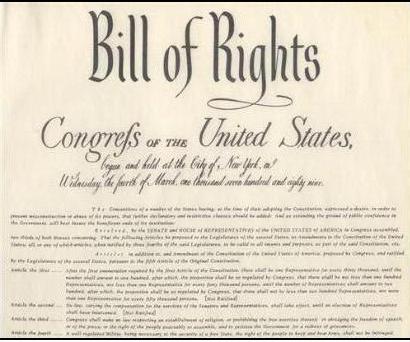
The 5th Amendment specifically protects people from actions of the federal government. The Constitution states in the 5th and 14th Amendments, that the government shall not deprive anyone of “life, liberty, or property, without due process of law…” “Due process” means that laws must be applied fairly and equally to all people, especially to a U.S. The United States Constitution’s 4th, 5th, 6th, 8th and 14th Amendments provide the constitutional basis for the most extensive protections of rights that protect citizens from governmental power. 
For example: Article I affirms the right of a Writ of Habeas Corpus, in other words, the right to a court order that requires a judge to evaluate whether there is sufficient cause for keeping a person in jail. The Rights of individuals accused of crimes are protected in many sections of the U.S.
What are the foundations of the rights Americans can claim if they are either accused of an alleged crime or prosecuted for an alleged crime?. What parts of our Constitution protect citizens against the Government’s accusations of wrong doing?. Glucksberg indicated that an unenumerated right must be carefully described, closely tied to American history and traditions, and implicit in notions of "ordered liberty." Other Court decisions have departed from that approach in favor of a more fluid, case-specific analysis.How Does The United States Constitution Protect U.S. Standards for applying substantive due process remain murky, though. The Court thus struck down a Connecticut law preventing married couples from using contraception. These include the right to assembly and protections against searches and seizures. Connecticut, the Supreme Court decided that the right to privacy is implied from several provisions in the Bill of Rights. This is also not explicitly provided in the Constitution. More recently, substantive due process often has involved the right to privacy. However, this line of reasoning ended during the New Deal era, and economic applications of substantive due process have been widely discredited. The Court reasoned that these regulations violated the freedom of contract, which was an unenumerated right. Historically, substantive due process formed the basis of decisions striking down state regulations that protected workers. It stems from Supreme Court decisions finding that due process protects substantive rights that go beyond the rights specifically enumerated by the Constitution. The second thread of due process doctrine is more controversial. Factors to consider include the nature of the right, a comparison of the procedures provided to alternative procedures that could have been used, and the burden imposed on the government in using other procedures. When considering whether due process has been satisfied in these less obvious cases, a court will weigh individual rights against government interests in a balancing test provided by the Supreme Court. Recipients of some government benefits, for example, are entitled to due process before the loss of their right to benefits. The Supreme Court has determined that property rights do not simply involve real estate or tangible items of personal property. They also must have their case heard before an impartial tribunal. #The right to due process means that government trial
A jury trial is not necessarily required, but the individual must have notice of the proceeding and receive an opportunity to be heard. One thread of due process doctrine involves the procedures that are required before the government can remove life, liberty, or property. Substantive due process: fundamental rights not explicitly provided by the Constitution, such as privacy.Procedural due process: steps that must be taken before the government can remove life, liberty, or property.In other words, state and local governments must not infringe on them. Although the Supreme Court determined that the Due Process Clause does not automatically incorporate every right in the Bill of Rights, most of these rights have been gradually incorporated over time.

These rights initially protected individuals only against federal government actions, while state governments were constrained by state constitutions.

The Due Process Clause in the Fourteenth Amendment incorporates nearly all of the rights provided by the Bill of Rights, which consists of the first 10 amendments to the Constitution.

However, modern understandings of due process extend further. The traditional definition of "due process" is that the government cannot take away life, liberty, or property from any person without a legal proceeding. The Constitution contains two due process clauses: a clause in the Fifth Amendment that applies to the federal government and a clause in the Fourteenth Amendment that applies to the states.








 0 kommentar(er)
0 kommentar(er)
